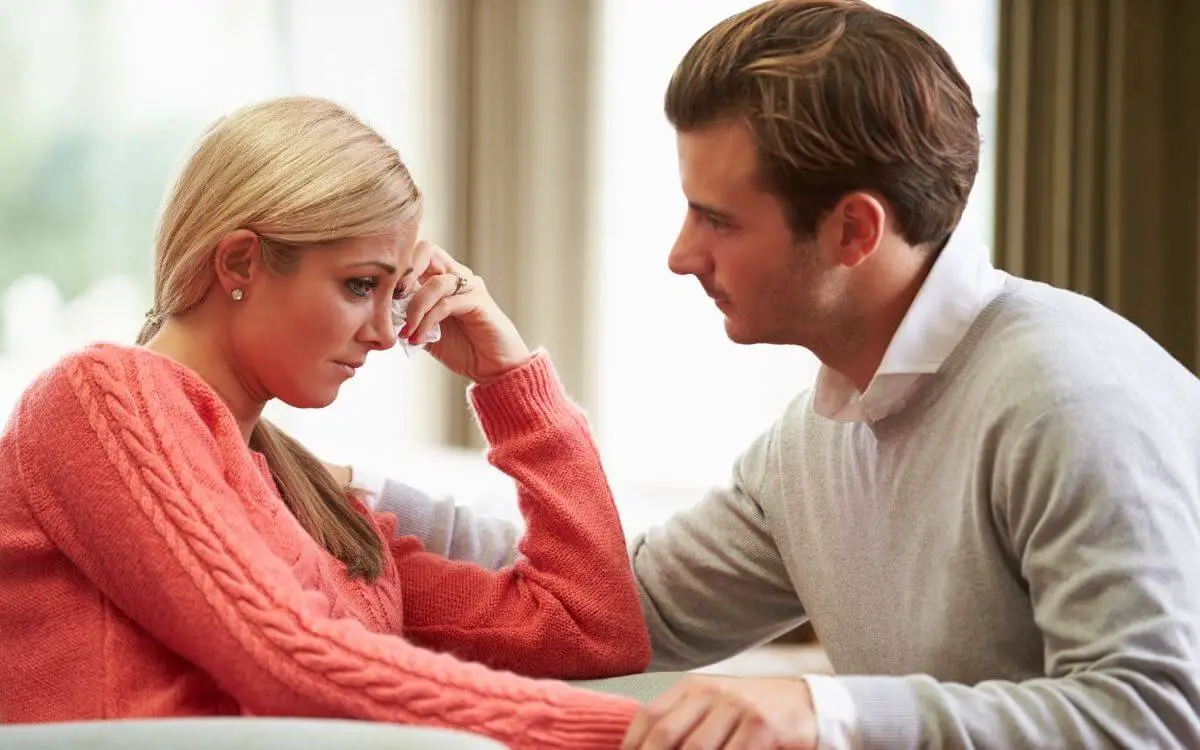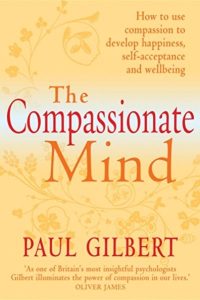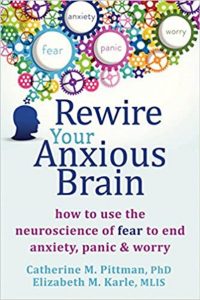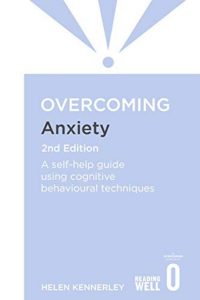What depression does to a marriage?
What can depression do to a marriage is the point of view of a man, who helped his wife in the darkest moments of her life.
I am writing this article to share my knowledge with you from the perspective of a man whose wife has suffered from depression for the majority of her life. I need to stress here, that I am not a psychotherapist. However, I have years of experience in support.
- What can you do?
- What can you do when depression affects your marriage?
- The support you need for a depressed person!
- The impact of depression.
- It's not easy with depression in a marriage.
- Depression and marriage.
- My wife's anxiety…
- A deeper and darker state of mind…
- How can you help someone who suffers from depression?
- The best way to help.
- Final word…
What can you do?
What can depression do to you and your depressed spouse?
Depression affects people in various ways. Mental health problems are often the reason for broken relationships, the destruction of families, and sometimes even the loss of a loved one. It sounds frightening because it’s true.
Depression is the darkest form of it. Untreated can drive the sufferer to attempt suicide. This was the case for my wife when she was feeling lonely despite my best efforts.
However, despite the challenges that the person has to deal with, these frightening and dark moments are possible to deal with, and the realization of the fact that you can overcome these feelings with the help and support of a friend, relative, or partner, gives you a reason for hope.
When I was at work, I worried that my wife couldn’t cope. She was so depressed at the time she needed my full attention as anything could trigger her suicidal thoughts at the time. To feel depressed and feel hopless, even when taking medications can be hard.
As a loving husband, I had to take care of everything at the time, I left work for two months to take care of my wife during the darkest time of her life. She needed to get help from me as she had nobody else.
The wife’s depression also impacts the husband’s emotional health. Taking time off work for her affects finances since none of you works at the time. It’s about recovery, it matters more than your job. Partner’s depression makes you feel more depressed too. You become anxious, angry, and resentful.
Ultimately, the consequences of not addressing depression lead to divorce or the loss of a loved one, especially because of the lack of sex drive that causes a real hard time for couples. But there’s hope and you can get help with such hard time when you learn what to do.
What can you do when depression affects your marriage?
- Learn about depression.
- Be there.
- Encourage treatment.
- Create a supportive home environment.
- Focus on small goals.
- Know the warning signs of suicide.
The support you need for a depressed person!
My wife went through a lot – an eating disorder, anxiety and depression, and Obsessive-Compulsive Disorder (which she still battles with). At times she became suicidal. Your depressed spouse also may feel that way. As if it wasn’t enough, lately my wife battles with a terrible chronic condition – endometriosis.
Yes, it sounds complex, but an anxious mind usually goes along with OCD (Obsessive-Compulsive Disorder), which is a coping mechanism that people use to deal with extreme anxiety.
Depression is often the outcome of living in this cycle of fear for too long. For a depressed person is difficult to escape it. The objective of this post is to show how it is possible to help and support someone who is suffering, and help them get the right professional support as well.
We want to show every partner and the depressed person who suffers from this terrible illness how to find the middle, and how to help us help you by understanding our perspective.
My wife thought about depression and our marriage, she has read many books on mental health. She has also had lots of different types of therapy and now manages to largely control her anxiety using CBT techniques.
Her depression has lifted without the use of antidepressants, bearing in mind she was previously on them for 18 years of her life!
My wife tried to grasp as much support as she could, all in search of a solution, to help herself, and to answer questions she had.
Books that help.
She began by reading a lot of books. I have to agree, these books are very helpful in helping you understand your anxiety and depression, and helping you get out of the cycle. You can access them by clicking on each one below. Allow me to list them for you:
You may access these books by clicking either on the links above or the book covers below…
My wife has read this book in a jiffy! It helped her during her dark times to find compassion and love for herself. For somebody like M, who suffered from severe depression, I noticed that the harshest critic of her was herself. It is never helpful to be told to pull ourselves together by others but saying it to ourselves leads us in only one direction – into a terrible despair.
I listed this book because M also suffered from anxiety at that time, it helped her mindset and depression. An obsessing, ruminating, and dwelling on things may or may not happen, but this book makes it simple to understand, how to manage your fear. Your brain is a very powerful tool, and the more you work to change your mindset, the better you’re going to feel.
This is another book that my wife reached for during her depression because it offered my wife a self-help program, written by one of the leading authorities in CBT. M also suffered at the time with OCD. A whole range of anxieties and fears are explained, from panic attacks and phobias to obsessive-compulsive disorder and anxiety. That really helped her!
A whole range of anxieties and fears are explained, from panic attacks and phobias to obsessive-compulsive disorder (OCD) and generalized anxiety. That really helped her!
These books are fantastic, but to speed up the process of your recovery, you need to do more than read books in order to change your situation.
Even though books on the subject of mental health can change your perspective on things, the important fact is that if you don’t have a helping hand, such as a qualified psychotherapist, the books don’t really achieve the required effect, but they are good to start with whilst you are waiting for therapy.
Unless you can afford to see a private CBT therapist, you will usually have to wait in a queue for months before your first appointment. That was the case for my wife, she waited 9 months the first time around!
It’s really not good enough, but that’s because there is still a great lack of funding for talking therapies on the NHS!
This is where the support of your loved one comes in handy. For my wife, waiting 9 long months for her first appointment was soul-destroying.
It is simply too long and it led her to self-harm and even attempt suicide! Depression affects people to that extent.
The impact of depression.
How depression affects you and your depressed spouse? We see so much advice on how to deal, cope and live with mental illness, but nobody writes about how it is to be in the shoes of a supporter, so you can get the idea of how you can help someone.
That’s a subject for another article, which I am going to write very soon. Our marriage survived for many years because we chose to fight, and I believe it will continue to blossom. Take a look at my point of view on it, how I cope, how I help my wife on a daily basis, and how we make each other happy, despite the difficult times.
It’s not easy, but life is not easy in general. Sometimes the struggles in our lives help us to appreciate the little things. Sometimes we need to struggle in life to wake up to what is really important!
It’s not easy with depression in a marriage.
Mental illness is impossible to describe if you haven’t been through it. I am not a therapist, but I am an expert on my wife.
Standing on the sideline when a partner goes through depression feels like a helpless experience. You might feel frustrated and overwhelmed.
Whenever you attempt to help, you feel rejected or ignored. That’s what depression can do! It can be very difficult at times.
There are times when you might even feel responsible for your partner’s depression in some way. This illness can isolate people despite their best attempts to help. On occasions I was told to leave her alone and the way my wife expressed it was through shouting.
Naturally, you feel judged. You haven’t done anything wrong. All you try to do is help, but instead, you receive negativity. It is the negativity that impacts many relationships and leaves loved ones feeling helpless and afraid.
At the time the mood is definitely sad, it’s filled with anger. It is not the sufferer’s fault, but the person cannot help feeling otherwise. Outbursts of anger and blaming others are common. The lack of interest in pleasure is very noticeable.
You notice that your partner seems not to care about finding joy anymore. Not only is her/his depression more than enough to feel negative, the realization of the fact that the argument just occurred, is powerful enough for the sufferer to feel guilty.
As of today, September 2019, my wife won the battle with her depression. Of course, she still feels anxious at times, as life always finds its way to surprise us, sometimes she gets sad, but she is no longer depressed.
By the way, my friends, if you suffer from chronic stress or/and anxiety, we have a solution to it for you!
If you haven’t tried yet, go ahead and take our 5-day stress-busting challenge! You have absolutely nothing to lose but a great chance here. Give us just 5 days and we will greatly minimize or even get rid of your anxiety!
We use techniques widely recognized by mental health therapists, which are difficult to access unless you pay or wait a few months in the queue for them.
They are proven by my wife and very helpful in treating various worries, anxiety, and depression that so many people battle with today.
The content itself that we provide through our emails is extremely valuable and nowhere to be found in our articles! If you really want to get rid of your anxiety, you simply have to try it! So…
Depression and marriage.
Here are a few pointers on what depression does to a relationship, because it also gives you both anxiety.
There is a difference between anxiety and depression. As we know, the symptoms of general anxiety and panic attacks are not the same, but they fall into a similar category. Anxiety is a feeling of worry or nervousness about something uncertain.
Depression has completely different symptoms and can come as a result of prolonged anxiety or not.
Depression may feel like being in a bottomless hole, where the person feels no motivation, no joy, and often feels there is no point in trying to take action to change things anymore. They can almost feel numb, like nothing matters anymore. It is the same for men and women despite theirgender differences.
Anxiety can seem like a condition in which people are full of energy, almost living on their nerves. People with anxiety experience bursts of adrenaline which are brought about by feelings of fear and sometimes anger. You will not be happy in an angry marriage.
People are in a constant hurry, to work, for a meeting, back home, etc., and often all the personal worries we have are still hanging about in the background.
We only have time to reflect when we stop at the end of the day. When the night comes we think about the worries of that day, but also all the other personal worries that are in the background. This is when anxiety really kicks in!
My wife’s anxiety…
What I’ve found with my wife, is that throughout the day she manages to suppress her feelings of anxiety, fear, and anger, but then they exhibit themselves in the evening, when she settles down and has time to think.
She feels negatively thinking she has a poor body image, where she’s infact, beautiful.
Sometimes when my wife is actually relaxed and not thinking at all she has all of sudden experienced a panic attack… That is what depression does – you constantly feel unsure about what and when is going to happen!
A panic attack is a sudden episode of intense fear that triggers severe physical reactions when there is no real danger or apparent cause. They can be extremely frightening and can make the person feel like they are losing control, having a heart attack, or even dying.
Panic attacks can come on suddenly and without warning at first, but over time, they’re usually triggered by certain situations.
Depression may feel like being in a bottomless hole, whereas anxiety can seem like a condition in which people are full of energy.
My wife has often experienced a period of depression after a prolonged period of anxiety, almost like her energy has run out and she can’t be bothered to fight anymore!
Anxiety and depression have differences but also have similarities. They usually go hand in hand. The main difference between them is the level of energy.
Anxiety causes a burst of energy and adrenaline, and depression sucks the energy away!
For that reason, it seems impossible for someone to experience them at the same time. However, some people (like my wife) experienced anxiety and depression in cycles, which means they often experienced the symptoms of anxiety that get to a peak, and then this is followed by exhaustion and a feeling of depression.
This cycle can become a continuous one that can destroy the sufferer’s quality of life.
On the other hand, some people do not suffer from anxiety but suffer from a constant depression that never seems to lift, which is equally debilitating. Either way, it is not easy for the person, but it is also difficult for the person who is trying to help them. There are no gender differences for depression.
It’s individual.
Not everyone experiences anxiety and/or depression in exactly the same way. Every person is an individual.
For instance, you might experience bursts of worry and anxiety, that tire you out and this is followed by one, two, or maybe three days of a depressive state where you feel depleted of energy.
At this stage people who suffer may feel that everything is useless and pointless, they may cry on and off throughout the day, because of the emotional pain and frustration that they’re feeling.
At worst people self-harm and even contemplate suicide. This is the worst of what depression does to couples. This is why emotional connection is vital because of the abnormal psychology depression causes.
My wife tried to do so on a few occasions. Luckily I was near. I hugged her tightly and promised to never abandon her in need. Our loving relationship helped us get through her suicidal thoughts and overall our marital problems caused by depression.

A deeper and darker state of mind…
Unlike physical illness, major depression is a far deeper and darker state of mind. It can affect family life, and personal relationships by causing relationship problems.
There is common confusion about the differences between these mental illnesses. Some people incorrectly use both terms depression and anxiety.
Both are distinct mental illnesses with different symptoms. When thinking about a depressed spouse, it is important to know, that their depression is not short-term sadness or feelings of unhappiness. Your depressed partner has a long-term condition.
It keeps people from performing their basic activities because they have lost interest in them due to the overwhelming feeling of sadness. The most common symptoms of depression may include:
- body aches and pains
- lethargy
- feeling hopeless
- chronic fatigue
- sometimes people may contemplate self-harm
These symptoms can persist over a long period of time, sometimes weeks, months, or even years. Depression in a marriage can last.
While depression can affect a person psychologically, it also has the potential to affect physical structures in the brain. These physical changes range from inflammation and oxygen restriction to actual shrinking.
Not going into too much detail, the amount these areas shrink is linked to the severity and length of the depressive episodes last.
There are also new links being made between inflammation and depression. It’s still not clear, whether inflammation causes depression or vice versa. Depression has been linked to reduced oxygen in the body.
These changes may be due to changes in breathing caused by a depressed person. Your depressed partner should take a look at their breathing pattern.
How can you help someone who suffers from depression?
Finding a therapist to solve your marital and family processes takes time, so here is in a nutshell, what you can do:
- Learn about depression.
- Be there.
- Encourage treatment.
- Create a supportive home environment.
- Focus on small goals.
- Know the warning signs of suicide.
An important first step in helping a depressed partner is to understand this illness yourself. Symptoms of depression can vary, but they can change over time. It’s never the same, not for everyone.
Every person is different and has different reasons for their anxiety or/and depression. In most cases, doctors do not understand that people are different and treat everyone the same, but when it comes to treatment and managing their illness, everyone has their own individual needs.
We can ask ourselves endlessly what depression does and never find all the answers. What’s important is to find a solution to it.
Every marital relationship encounters issues. Relationship problems happen to healthy couples, but when a chronic condition adds up, you end up feeling worse.
You can read about depression and consult a professional for more information, but the best way to understand how your partner experiences depression is to openly ask questions and listen, listen, listen… Be there. Simple, yet powerful. Be there.
Of course, you should acknowledge professional help such as the psychotherapist’s suggestions, but the most helpful advice I can give you is – to be there and listen to the depressed person.
Do not talk whenever your partner opens up to you unless they want you to. It is very important, not to interrupt. Just listen. Allow me to explain this, by giving you examples of my own.
Many times, I have caught myself “interrupting” my wife’s speech trying to give solutions to the problem. In my wife’s eyes, I wasn’t listening. My constant interruptions made her feel angry and she would finish our conversation upset.
The reason for this was (as she explained) the feeling that she was being ignored and not listened to, while she made her best efforts to explain how she felt. Suggesting solutions while she was speaking, felt to her like a total lack of respect for what she had to say.
In other words, if I talked halfway through her sentence, I was ignoring her. So, my interruptions meant I wasn’t there for her.
In other words, if I talked halfway through her sentence, I was ignoring her. So, my interruptions meant I wasn’t there for her.
It is difficult to know how to help a depressed partner, but your support is important. You can’t cure your partner’s depression alone, but you can help your partner along the road to recovery. You both require a good mental health.

The best way to help.
The best way to help is to find available treatment in your area, find support groups, or talk to other people battling depression to find out what works. I and my wife joined a mental health support group. We attended meetings and talked things out. And if you don’t want to talk, often the best thing you can do for your partner is simply show up.
Some people might not recognize that they’re depressed. They might not understand the symptoms of depression and think that their feelings are just something they have to endure. This is why you need to encourage treatment.
It’s important to remember that your partner’s depression isn’t anyone’s fault. You need to give an emotional support, and create a supportive and safe home environment. You can help your partner by setting small goals and daily achievements. Breaking down larger tasks into smaller tasks can help your partner take small steps toward returning to normal daily activities.
Breaking down larger tasks (i.e. applying to new jobs) into smaller tasks (writing a cover letter) can help your partner take small steps toward returning to normal daily activities.
For people who struggle to get out of bed each day, focus on getting up, taking a shower, or even eating a healthy meal. Your loved one is likely to improve, but you will need to be patient and understanding.
Lastly, suicide… The risk of suicide is always elevated during major depressive disorder. It’s important to know the red flags and get immediate medical assistance:
- Talking about suicide
- Getting a means to attempt suicide, such as purchasing a gun or stockpiling pills
- Extreme mood swings – very high one day and deeply discouraged the next
- Social withdrawal
- Preoccupied with thoughts of death
- Noticeable changes in normal daily routines
- Feeling overwhelmed with hopelessness
- Engaging in risky or self-destructive behavior, including drug or alcohol abuse or reckless driving
- Giving away belongings
- Saying goodbye
Final word…
Psychological science reveals that caring for someone who suffers from depression is emotionally draining for the supporter. Gender differences make us hard to understand one another. It’s very important to practice self-care and think of yourself because if you cannot help yourself, you can’t help someone else.
If you enjoyed this post, I’d be very grateful if you could help spread it around by emailing it to a friend or sharing it on Twitter or Facebook, or another social media network.
Also, tell us what you think about this post. You may have other ideas of what depression does. We will gladly take any suggestions on board, so share your thoughts in the comments section below!


About Me
Hi, I’m Lucjan! The reason why I decided to create this blog was my beautiful wife, who experienced a lot of pain in life, but also the lack of information about endometriosis and fibromyalgia for men…



